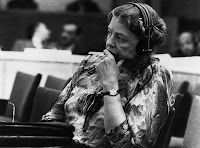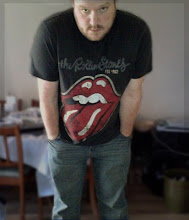
Article 1.Today the Universal Declaration of Human Rights celebrates its 60th anniversary. This is good news for me as it gives me the excuse to get my year eights to write the universal declaration of twelve year olds’ rights. It’s also, in my opinion, good news for the human race – but then I’m a bleeding heart liberal so you expect me to say that. For many, while the sentiment is admirable the implementation of these rights causes problems.
All human beings are born free and equal in dignity and rights.They are endowed with reason and conscience and should act towards one another in a spirit of brotherhood.
Article 3.The European Court of Human Rights comes under a torrent of abuse on a regular basis from large sections of the British press. It is seen as a set of rules that allow terrorists and criminals to operate on the same basis as the good, hard working, tax paying, church going, bread baking people of the world.
Everyone has the right to life, liberty and security of person.
Article 4.It isn’t the UN Universal Declaration of Human Rights they are directly attacking. Over here it is generally the much more recent Human Rights Act (2000) that faces criticism. And the European court of human rights regularly makes front page news when it finds against public opinion. Jack Straw, ironically the British Home Secretary when the Government brought in the Human Rights Act, recently admitted that the Act was seen as “a villains’ charter and promised reform.
No one shall be held in slavery or servitude; slavery and the slave trade shall be prohibited in all their forms.
Article 5.The Conservatives have been calling for massive changes for a long time. And the right wing press have been unrelenting:
No one shall be subjected to torture or to cruel, inhuman or degrading treatment or punishment.
“It has given prisoners rights to drugs, and foreign hijackers the right to live in Britain. It has given gipsies (sic) the right to squat, and enabled the rapist Anthony Rice to get out of prison early to murder an innocent woman.” said Anthony Brown in the Daily Mail last year, “It allowed the killer of London headmaster Philip Lawrence to live near his widow because it was against his right to family life to be deported to his native Italy.”
You see the problem is that, while we like the idea of human rights, we’re not so keen on the universal aspect of it. It’s all well and good protecting the rights of the masses to practise religion in a free and open way but we don’t like it so much when that religious message turns against the type life we’ve been living so comfortably for so long. We applaud the right to free assembly but we’re not so happy when groups of people we don’t like come marching down our roads dressed in drag.
Article 9.It was a moment of delicious irony last week when the same politicians and newspapers who regularly vilify the Act found it supporting them. The English Police lost a case in the European Court of Human Rights that sees them have to destroy DNA records of innocent men. For years the Police have been building and storing records on suspects whether they went on to be found guilty or not. They claim it has helped them catch people who, despite being found innocent of one crime, go on to commit another one. I claim it was a worrying precedent – and the European Court of Human Rights agreed with me.
No one shall be subjected to arbitrary arrest, detention or exile.
Article 18.I can’t, and won’t, claim that the Human Rights Act is a leak-proof guarantee of liberty and equality. The British Human Rights Act, the European Convention on Human Rights, and even the UN Universal Declaration of Human Rights are far from perfect – I’m not sure it’s possible to enshrine something like human rights on paper. But I am sick of hearing people blame the woes of our society on a list of articles; most of which are common sense. The fact that it doesn’t prescribe responsibility with the rights does not invalidate the rights themselves. Why should it? Why have we become so incapable of taking responsibility for our own responsibilities. In one of my classes recently we stumbled upon the difference between the letter of the law and the spirit of the law. Is it not sad that in searching for gaps in the letter of this declaration we miss out on the immense spirit that shines through it. It is simply, as it claims to be, “a common standard of achievement for all peoples and all nations.”
Everyone has the right to freedom of thought, conscience and religion; this right includes freedom to change his religion or belief, and freedom, either alone or in community with others and in public or private, to manifest his religion or belief in teaching, practice, worship and observance.
Article 19.
Everyone has the right to freedom of opinion and expression; this right includes freedom to hold opinions without interference and to seek, receive and impart information and ideas through any media and regardless of frontiers.
So I will be raising a glass to that little list today; for when I read through the UN Declaration of human rights for the first time a couple of weeks ago it reminded me of Thomas Jefferson’s magnificent words, “We hold these truths to be self-evident, that all men are created equal, that they are endowed by their Creator with certain unalienable rights, that among these are Life, Liberty and the pursuit of Happiness.”
Article 26.
(1) Everyone has the right to education. Education shall be free, at least in the elementary and fundamental stages. Elementary education shall be compulsory. Technical and professional education shall be made generally available and higher education shall be equally accessible to all on the basis of merit.
(2) Education shall be directed to the full development of the human personality and to the strengthening of respect for human rights and fundamental freedoms. It shall promote understanding, tolerance and friendship among all nations, racial or religious groups, and shall further the activities of the United Nations for the maintenance of peace.
(3) Parents have a prior right to choose the kind of education that shall be given to their children.
For a full list of the articles that make up the declaration go here.

No comments:
Post a Comment